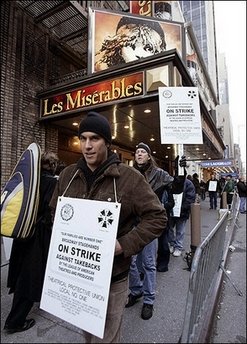|

Broadway stagehands walk a picket line in front of "Les Miserables"
at the Broadhurst Theater in New York. A strike by Broadway
stagehands entered its third day Monday with apparently no end in
sight, partially paralyzing one of New York's flourishing
industries and costing millions in lost revenue.(Xinhua/AFP
Photo)
|
There will be no performances on Broadway in New York City Monday
as the stagehands' strike enters its third day.
More than two dozen Broadway plays and musicals, such as "The
Color Purple," "Chicago," "Grease," "Phantom of the Opera," have
been shut down in the past two days by the work stoppage.
Shows produced by non-profit organizations or shows in theaters
owned by non-League members were not affected. But Monday is the
day off in observance of Veterans Day, an official national holiday
in the United States.
The stagehands union, Local One, said Sunday it will not return
to the negotiation table until producers show them some
respect.
Union leaders also turned down Mayor Michael Bloomberg's offer
to mediate a settlement.
On the other hand, the League of American Theaters and Producers
highlighted examples of what they called "featherbedding,"
describing rules that require a certain number of stagehands to be
present, even when there is no work for all of them.
In a statement, the producers said Local One is "protecting
wasteful, costly and indefensible rules that are embedded like dead
weights in contracts so obscure and old that no one truly remembers
how, when or why they were introduced."
The major sticking point has been the number of stagehands
required to work each show. Producers accuse the union of forcing
them to hire and pay more workers than are really needed. But the
union says it will not give up job protection.
The 3,000-member Local One says it made a last attempt at
negotiations with the League of American Theatres and Producers,
but the three-month-long could not reach an agreement. So the union
started a strike on Saturday, two days after talks broke down on
Thursday.
On Sunday, dozens of stagehands lined up at the Times Square in
the chilly weather, carrying hot coffee to warm their hands.
A sign said there were no Broadway shows available and suggested
off-Broadway options.
No new negotiations have been scheduled between the union and
the league since the two sides remain far apart.
How long most of Broadway would remain dark remains uncertain
and the impact is harder to determine. The league said a strike
would cost the city US$17 million a day.
Mayor Bloomberg says he hopes the strike can end soon because
money is being lost.
"The worst damage is to those who work in the theater -- the
stagehands, the actors, the ushers, the musicians and the people
that own the plays, the investors," said the mayor. "There are
people in the neighborhood, restaurants, that are going to have
less business."
In March 2003, more than a dozen Broadway shows went dark after
musicians went on a four-day strike, costing the city millions of
dollars.
?
(Xinhua News Agency November 13, 2007)